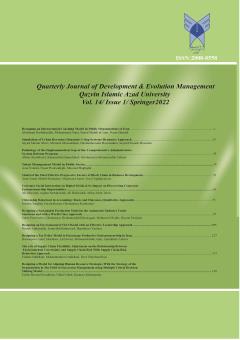Presenting a sustainable social economic model through venture capital using the Delphi method
Subject Areas : مدیریت
alireza mirshahi
1
,
Ali Khamaki
2
*
,
Majid Ashrafi
3
,
hossein abbasiyan
4
![]()
1 - Doctoral student, Aliabad Katul branch, Islamic Azad University, Golestan, Iran
2 - Assistant Professor, Department of Management, Aliabad Katul Branch, Islamic Azad University, Golestan, Iran (in charge of correspondence) 2
3 - Associate Professor, Aliabad Katul Branch, Islamic Azad University, Golestan, Iran3
4 - Assistant Professor, Department of Mathematics and Statistics, Aliabad Katul Branch, Islamic Azad University, Aliabad Katul, Iran4
Keywords: Sustainable social economy , venture capital , corporate social responsibility.,
Abstract :
In this, this research is practical in terms of purpose, and concepts were extracted by using theoretical foundations, background and semi-structured interview. From the qualitative aspect, the participating team consisting of academic experts and managers consisting of managers of venture capital companies, venture funds and capital supply, accelerators and investment angels and based on the criteria of experience, sufficient knowledge and research history with a purposeful sampling method in the snowball method in the number of 10 people were chosen. The findings showed that in the sustainable economic sector through venture investment, the categories of venture investment risk acceptance, venture investment liquidity management, venture investment returns, stock valuation, competitiveness, economic participation, financial flexibility, improving the business environment and increasing the quantity or quality of the workforce were identified. The sustainable social sector was identified through risky investment in the categories of social participation, social relations, information transparency, educational facilities, welfare facilities and environmental concerns. The prioritization of sustainable socio-economic dimensions through venture capital showed that social participation with a final weight of 0.079 is in the first priority, social relations with a final weight of 0.057 is in the second priority, increasing the quantity or quality of the workforce with a final weight of 0.038 is in the third priority. The results of model fitting showed that all identified categories were confirmed.

